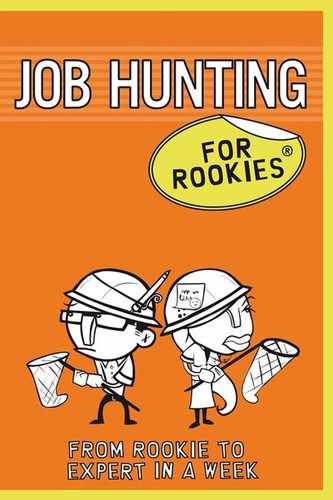CHAPTER 1
Setting your sights on
what you want
Finding the work you want
The first step in finding a new job is deciding what kind of work you want to do. Now, you may be thinking, I know exactly what I want to do. But let me ask you this: are you 100 per cent happy in your current work? Whether you are currently in work or out of work, does the prospect of your job have you jumping out of bed in the mornings, excited at the mere thought of it?
If you love or at least like the work you do, you will find it much easier to get a job. There is so much competition for jobs these days that if you see your work as a chore, you will not be able to convince an interviewer to hire you. Why should they give you the job when they can hire someone else who is genuinely enthusiastic about it?
So before you throw yourself into the hard work of looking for a job, spend at least a little time thinking about what your new job should be. Let’s work through a handful of exercises to uncover what you could be doing next.
 Rookie Buster
Rookie Buster
If you love or at least like the work you do, you will find it much easier to get a job.
Understanding the product that is you
When people are happy in their work, they usually work harder and end up being more successful too. And people are happy and successful when they get to combine their skills, personal traits and interests in their work.
Let’s get started with three exercises that will help you to learn more about yourself.
Self-Discovery 1: Understanding your skills
If you are good with people, you will thrive in an environment in which you can work with colleagues and customers. If you have a knack for technology, you may need to look for work with computers and gadgets. Or if you can handle numbers easily, then working with budgets or in finance may be where you should go. The more you get to use your talents on a daily basis at work, the more contented and productive you will be.
Look at the following list of skill-verbs. Put one tick next to each verb that you believe you possess. And put another tick next to it if you enjoy applying that skill. For example, I know that I’m actually quite good at numbers, so I’d put one tick next to “calculating”. But I don’t really enjoy having to pore over numbers, so I would not add a second tick next to it. Whereas I am good at coaching people and I enjoy it too – so “coaching” would get two ticks.
 Rookie Buster
Rookie Buster
The more you get to use your talents on a daily basis at work, the more contented and productive you will be.
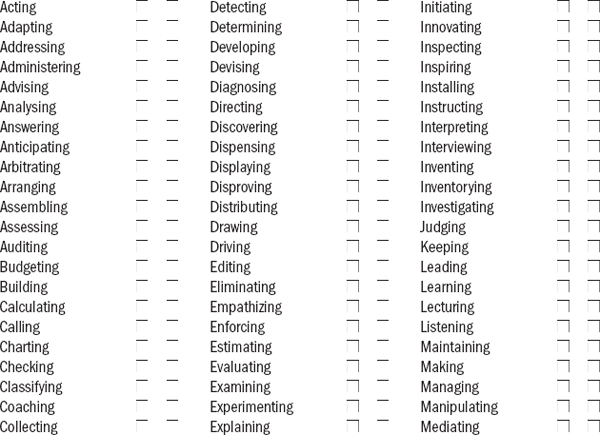
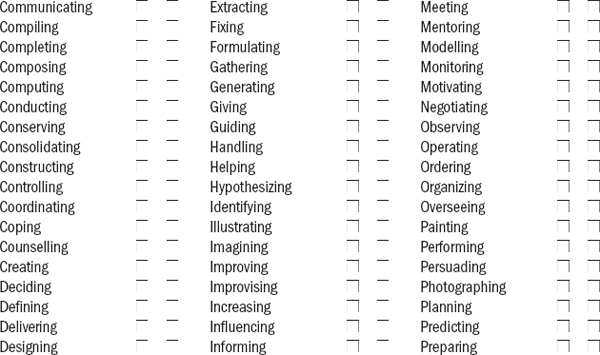
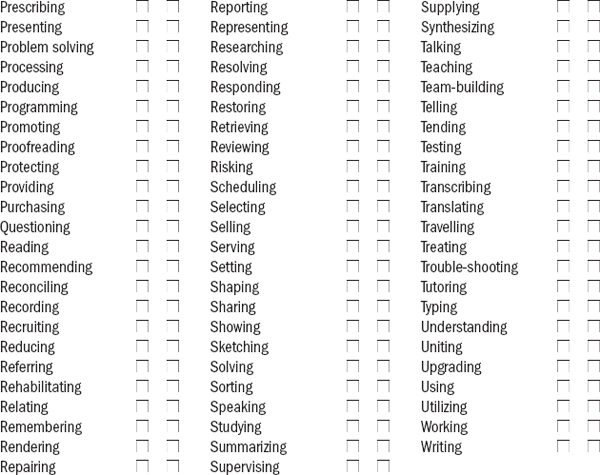

When you’ve assigned your ticks, take a look at your list. For each skill-verb that you put two ticks against, have a think what that skill could relate to. For example, if you enjoy communicating, what do you communicate? What do you test? What do you repair?
When you’re ready, let’s move on to the next exercise.
Self-Discovery 2: Highlighting your characteristics and qualities
Your skills are an important part of who you are. But you also probably have certain characteristics and qualities that influence how you deal with the world too.
If you are naturally someone who pays attention to detail, you will do well in a job that allows you to be careful and precise. But if you hate attention to detail, make sure you find a job that allows you to steer clear of the small stuff. If you are collaborative, you should probably look for a job that allows you to work with a team rather than one that insists you work mainly on your own.
Put a tick against any of the following words that describe you. If you’re not sure, why not ask a couple of friends how they would describe you too?
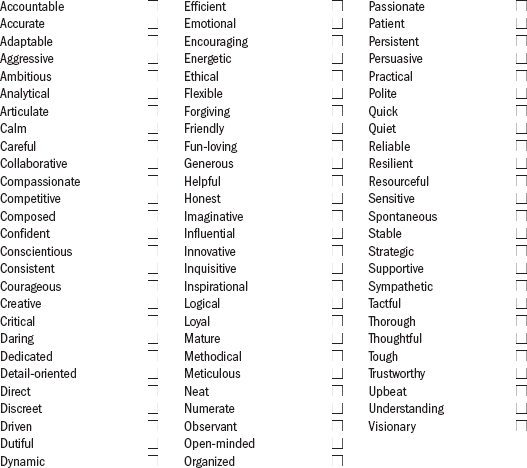
Now, you may feel that quite a lot of those words could describe you. But if you could only choose ten of them to describe you, which ten would you choose? Write them down on a separate sheet of paper.
Self-Discovery 3: Identifying your interests
Next, let’s think about the topics or subjects that most interest you. Ask yourself the following questions:
• If you could talk about any topic, what would that subject or field of interest be? For example, it could be antiques, the environment, food and cookery, mechanics or engineering, schools, overseas travel, religion, technology, photography, animals – and so on.
• What topics do you find yourself drawn to when you pick up a newspaper or magazine – such as finance, fashion, politics, home interiors, science, education, health and exercise, art, business, etc?
• What kinds of roles and job sectors appeal to you? For example, advertising, law, car industry, banking, manufacturing, pharmaceuticals, administration, public sector, textiles, and so on.
Narrowing your focus
Now look back at your skills, your characteristics and qualities, and your interests. Do any jobs pop into your head? Do you get a flash of inspiration, an “a-ha!” moment, telling you what you should be pursuing for your next job?
Don’t worry if you don’t have a clear idea yet. I’m going to guide you step-to-step to finding the right kind of work for you. First of all, you need to summarize the product that is you:
1. Go back to the exercise on strengths and pull out your top three to five skills. This handful of skills should be the ones that stand out as being of the most importance to you. Get a fresh sheet of paper and write down the heading “Skills”, then write down these three to five skills beneath it.
2. Go back to the exercise on qualities and characteristics and transfer the top five of those to this new sheet of paper under the heading “Qualities and Characteristics”.
3. Next, look back at the exercise on interests and identify your top three to five areas of interests – write these down under “Interests”.
Next, you are going to tap into your greatest resource: other people. If you are to find your way to the right job for you, you must talk to people and seek their advice:
1. Show your summary sheet of paper to at least half-a-dozen friends. Buy them a drink; take them out for a coffee. Pick up the telephone or drop them an email if you can’t get to speak to them. Explain that you’d like to find a job that allows you to apply your strengths, characteristics and qualities, and interests too. Ask them for their thoughts. Let them think and see what they can come up with.
2. Let your friends talk, and scribble down everything that they suggest. Their ideas may not make sense initially – they may seem irrelevant or frankly silly. But wait until you have spoken to the half-dozen people before you look back at the notes you have made. If they recommend that you speak to other people, go and do it. If they suggest that you should do some book research or check something out on the internet, do that too. But remember that people – not books or the internet – are your biggest resource. Even if you would much rather depend on your own reading, thinking, and resourcefulness, I can guarantee you that other people (and not you yourself) will help you to find inspiration.
3. If you don’t come up with any ideas from your first half-dozen friends, reach out to another half-dozen people. And keep repeating this until you hit that brainwave.
Keep an open mind. You may not find a job that exactly matches every single one of your talents and interests. But by talking to other people, you may surprise yourself by finding a job that matches many of them. When you find the right job, you should feel excited – you will know that you’re on track to finding a great new career for you.

 Rookie Buster
Rookie Buster
When you find the right job, you should feel excited – you will know that you’re on track to finding a great new career for you.
Checking that it’s the right choice for you
If you’re not sure about the types of jobs that you or your friends come up with, you need to do a bit more digging.
Go to visit places where those jobs are and talk to the people doing those jobs. If you think you’d like to work for an airline, go and visit the airport and soak up the atmosphere. If you think you’d like to work with landscape gardeners, visit a garden centre and chat to the staff. You will almost always find that people are happy to talk about their jobs.

If it’s impractical for you to turn up at their place of work, get in touch with the trade body or association that looks after people who do that line of work. For example, if you think you may want to train as a veterinary nurse, type “veterinary nurse association” into your favourite internet search engine and give the association a call.
In talking to the various people you meet, you may want to ask questions such as:
• “How did you get into this type of work?”
• “How do you spend your time on a daily basis?”
• “What do you most enjoy about it?”
• “What frustrates you about it?”
• “What sort of training did you need to do to get into this career?”
By talking to enough people, you should be able to decide whether a particular type of job or field of interest really is sufficiently exciting for you to pursue.
Setting goals for an effective job hunt
When you have decided on the kind of work you want to pursue, you can get started on finding it.
Writing your mission statement
To help you retain your focus for an effective job hunt, you should write a mission statement that summarizes what you are looking for. This statement will act as a reminder not only of what you are looking for, but also of what you can bring to an employer.
Here’s an example of a completed mission statement and how it’s broken down [shown in brackets]:
I am looking for a job as a branch banking manager [job title], which will allow me to apply my key skills in leading a team of people, analysing numbers, advising customers and persuading them to use the bank’s services [skills from Self-Discovery 1]. I believe that I am a calm, competitive, confident, honest [characteristics and qualities from Self-Discovery 2] person – and I will use those qualities to do my best in my work. If at all possible, I will seek to combine my work with my interests in cars, computers and the health industries [interests from Self-Discovery 3].

Now it’s your turn. Fill in the blanks by looking back at the results of your three Self-Discovery exercises:
I am looking for a job as a _____________________[job title], which will allow me to apply my key skills in [skills from Self-Discovery 1] _______________________________________ _______________________. I believe that I am a
[characteristics and qualities from Self-Discovery 2] ________ __________________________________ person – and I will use those qualities to do my best in my work. If at all possible, I will seek to combine my work with my interests in [interests from Self-Discovery 3]_____________________________________________.
When you have completed your mission statement, you can use it to keep you on course as you go about your job hunting activities.
Putting in the work
Now you can get started in looking for a job. However, the first thing you need to realize is that it’s called “job hunting” for a reason. Jobs won’t just land in your lap. Employers will not seek you out to offer you a job.
It is up to you to track down suitable employers. It is up to you to convince them that they should give you a shot. You need to put in the hard work, the hours, and the effort. Your likelihood of finding a great new job is in direct proportion to the quality and quantity of effort you put into your job hunting.
 Rookie Buster
Rookie Buster
Your likelihood of finding a great new job is in direct proportion to the quality and quantity of effort you put into your job hunting.
Assuming you’re doing the right stuff and spending your time productively, if you spend ten hours a week on your job hunt, you will probably find a job twice as quickly as someone who is spending only five hours a week on it. Now that may sound totally obvious – but it does need saying for some people (and I apologize if you are not one of them).
Quite often I come across people who complain that they can’t find a new job. But when I ask them what they are doing, they say that they spend just a couple of hours a week clicking on job websites, picking up the occasional newspaper, and sending off an application or two.
To get a new job, you need to view job hunting as your new job. If you are unemployed, you need to think of your job hunt as your new full-time occupation. You should get up and be ready for eight or ten hours’ work every day. If you’re currently employed, look at your job hunt as an additional, part-time job that you will have to squeeze in alongside your normal weekly activities in order to find a better job.
 Rookie Buster
Rookie Buster
To get a new job, you need to view job hunting as your new job.
But the good news is that you can get a new job. Work diligently at it and you will get a new, better job.
Coach’s notes 
• Remember that people who can apply their talents on a daily basis are both more satisfied and more successful in their work than people who can’t.
• Think about how you and other people would describe you. Understanding your personality traits and the qualities that make you who you are will help you to find work that allows you to be yourself at work.
• Wouldn’t you rather work in a field that interests you than one that feels like a constant chore? Figure out the topics and job sectors that appeal to you, and you can focus your job hunting efforts accordingly.
• Understand that other people are a huge resource. Talk to other people to help you generate ideas for jobs that you could do.
• Write up your mission statement to help you keep focused in your job hunt.
• Realize that it’s up to you to put in the hours and effort to land a new job – it isn’t going to happen on its own!
Go for it! Do take the time to figure out what kind of work you should be looking for. Too many people start their job-seeking campaigns by immediately looking for more of what they’ve always done. But if you aren’t excited by the idea of your work, how can you expect to be enthusiastic in chasing up job leads? If you’re passionate about what you want, you’re already halfway to convincing an employer to hire you!

Notes |
Notes |

